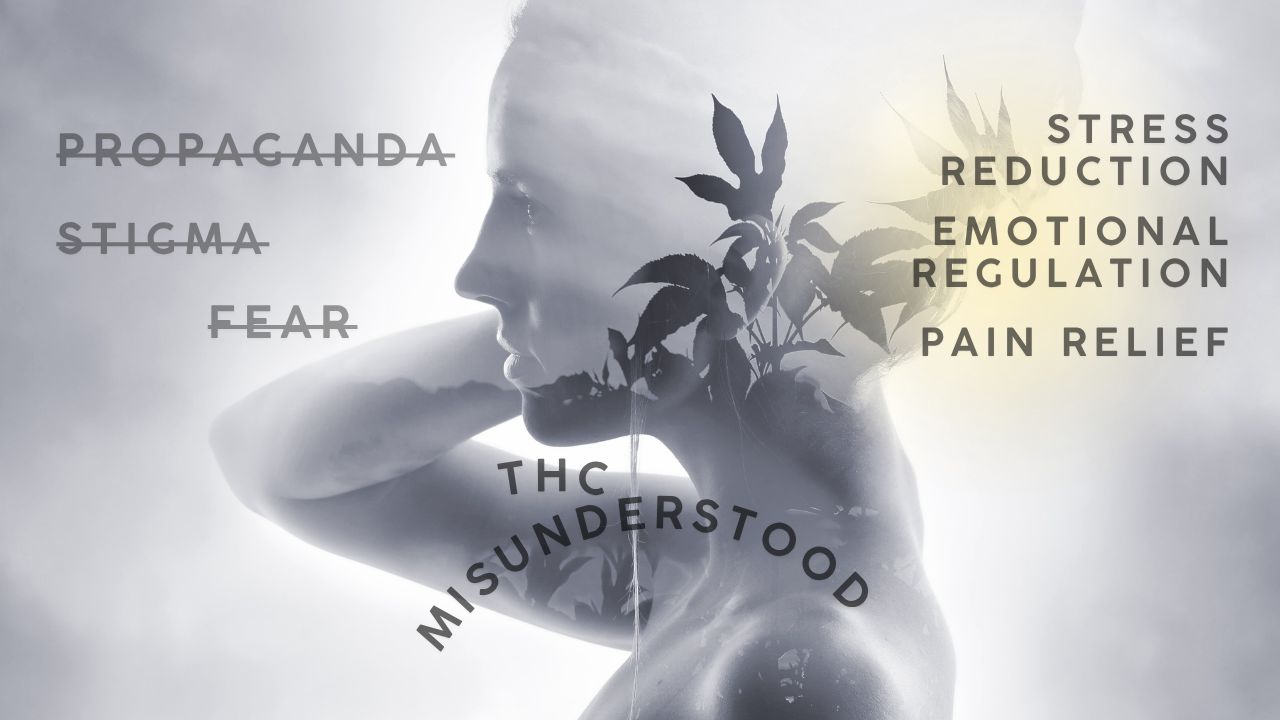Confronting Stigma: Science-Backed Benefits of THC
May 28, 2025
By William Brown, Certified Medical Cannabis Specialist
For decades, THC has carried a reputation that focuses more on stigma than science. Often dismissed as a substance folks only use to “get high", it’s been largely misunderstood despite growing evidence of its medical and cognitive benefits.
Research now shows that THC plays a critical role in pain management, nausea relief, and neurological conditions, while also demonstrating potential in stress reduction, emotional regulation, and cognitive flexibility. Yet, despite legalization efforts and shifting public attitudes, misconceptions persist, and stigma stays rooted.
This article is not about hype or exaggeration; it’s about facts. By examining open-access research, we’ll look at some of the science-backed benefits of THC that deserve attention beyond outdated narratives and cries from prohibitionists.
Medical Benefits of THC
For many folks, THC provides real relief in areas where traditional treatments (often) fall short. One of THC’s most well-established applications is for pain management, particularly for conditions involving chronic pain and inflammation.
Systematic reviews and network meta-analyses show that THC interacts with the endocannabinoid system to modulate pain perception, making it a viable alternative to opioids (1). In states with medical Cannabis programs, many chronic pain patients report substituting THC for prescription opioids, citing effective pain relief (2). Anecdotal evidence and personal experience support these findings, along with findings related to population studies, interventions, pain response, and side effects were reviewed and summarized (3).
Another widely researched medical benefit is THC’s ability to combat nausea and stimulate appetite, particularly in cancer patients undergoing chemotherapy. Studies confirm that THC reduces nausea and increases food intake, helping prevent weight loss in patients undergoing treatment (4). Additionally, research suggests that THC has neuroprotective effects, showing promise in epilepsy, multiple sclerosis, and Parkinson’s disease (5).
Cognitive and Emotional Benefits of THC
THC’s effects extend beyond its reputation for intoxication. By interacting with CB1 receptors in the brain, it has been found to influence mood regulation, making it a potential tool for stress and anxiety reduction. It has been observed that THC can also support social well-being, particularly in individual relaxation and anxiety reduction. Studies show that controlled THC consumption may help reduce social anxiety and increase emotional connectedness, leading to more positive interactions in social settings (6).
There have been reports that THC can also enhance cognitive flexibility, improving problem-solving and abstract thinking in certain contexts. Rather than impairing cognition across the board, THC has shown potential in supporting emotional resilience, particularly in adaptive thinking and creativity-driven tasks. Individuals may experience enhanced creativity due to Cannabis’ ability to produce such a jovial attitude, helping them approach challenges with a more open, imaginative mindset (7)
Shifting Public Perception
Although medical research and legalization efforts have helped redefine the conversation around Cannabis (to a degree), stigma still lingers heavily. Historically, misinformation has painted THC as a harmful substance with no medical value, yet scientific evidence tells a different story. As more folks turn to THC for legitimate therapeutic relief, public perceptions are starting to shift (ever so slowly) in response to medical Cannabis programs. Medical access has led to a certain level of increased acceptance and better-informed consumption behaviors, supporting THC’s place in discussions about wellness rather than just recreation.
Conclusion
THC has long been judged by stigma rather than science, but research continues to reveal its medical, cognitive, and emotional benefits. Whether it’s helping chronic pain, supporting mental health, enhancing cognitive adaptability, or improving the quality of one’s daily life, its applications go far beyond common misconceptions held by the misinformed and supported by prohibitionists.
By focusing on evidence rather than assumption, we can encourage more informed conversations, hopefully shifting perspectives from outdated bias and fear mongering to a science-backed understanding of THC’s potential.
References
1. Lee, M. T., Mackie, K., & Chiou, L.-C. (2023). Alternative pain management via endocannabinoids in the time of the opioid epidemic: Peripheral neuromodulation and pharmacological interventions. British Journal of Pharmacology, 180(7), 894–909. https://doi.org/10.1111/bph.15771
2. Bicket MC, Stone EM, McGinty EE. Use of Cannabis and Other Pain Treatments Among Adults With Chronic Pain in US States With Medical Cannabis Programs. JAMA Netw Open. 2023;6(1):e2249797. doi:10.1001/jamanetworkopen.2022.49797
3. Shehata, Islam et al. “Cannabinoids and Their Role in Chronic Pain Treatment: Current Concepts and a Comprehensive Review.” Health psychology research vol. 10,4 35848. 4 Oct. 2022, doi:10.52965/001c.35848
4. Emily Seymour-Jackson, Barry J.A. Laird, Judith Sayers, Marie Fallon, Tora S. Solheim, Richard Skipworth, Cannabinoids in the treatment of cancer anorexia and cachexia: Where have we been, where are we going?, Asia-Pacific Journal of Oncology Nursing, Volume 10, Supplement 1, 2023, 100292, ISSN 2347-5625, https://doi.org/10.1016/j.apjon.2023.100292.
5. Babayeva, Mariana, and Zvi G. Loewy. ‘Cannabis Compounds: Potential Therapy for Neurological Disease’. Medicinal Plants - Harnessing the Healing Power of Plants, IntechOpen, 24 June 2024. Crossref, doi:10.5772/intechopen.1005770.
6. Raymundi, A.M., da Silva, T.R., Sohn, J.M.B. et al. Effects of ∆9-tetrahydrocannabinol on aversive memories and anxiety: a review from human studies. BMC Psychiatry 20, 420 (2020). https://doi.org/10.1186/s12888-020-02813-8
7. Heng, Y. T., Barnes, C. M., & Yam, K. C. (2023). Cannabis use does not increase actual creativity but biases evaluations of creativity. Journal of Applied Psychology, 108(4), 635–646. https://doi.org/10.1037/apl0000599
About William Brown:
William owns and operates WbC Therapeutics, a company based on the therapeutic application of Cannabis as medicine. He is also a patient and authorized caregiver in his state. William is a certified Cannabis educator and coach.
Contact William at WbC Therapeutics through the e-mail link below to learn more about his services.
Effective Cannabis Newsletter is a platform to educate on the vital role of the Endocannabinoid System (ECS) in one's health. The information is not intended or implied to be a substitute for professional medical advice, diagnosis, or treatment. All content, including text, graphics, images, and information, contained in or available through this newsletter is for general information purposes only. It is not medical advice; it is health awareness.
Were you moved or inspired by a piece of content?
Do you have a suggestion or question for us?
Do you have a powerful story about your health and Cannabis?
Click the button and let us know!




